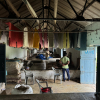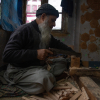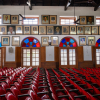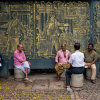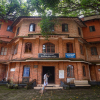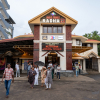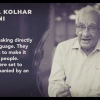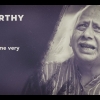Sahapedia: For any writer childhood is an important influence in shaping his writing. Could you talk about your childhood?
Anand: I grew up in the World War II and post-war period. My childhood. I was a typical product of that age, of that generation, lot of want, struggling for existence, struggling for education, poverty, famine, everywhere…I grew up in that background. My parents were educated. My father was a teacher. My mother also was educated. She used to read a lot -- English as well as Malayalam. Education was important but it was pretty costly in those years. We passed through that. See, I was in class 6 when India became independent. In the immediate years after that, of course, so many things were happening at that time- politically, socially, everywhere. My family had a very progressive outlook, culturally, in every other aspects too, though the only thing was that enough resources weren’t there. Lot of things were happening.
As I mentioned I was in class 6 when India became independent. Immediately after that the Temple entry happened in Cochin. My state was Cochin State. Those were the years of princely states. In 1948 the first election in independent India based on adult franchise happened in Cochin. So there was politically, socially, the whole society was very much alive with that. The movements, the leftist movement…In that election there was reservation for backward classes, there was reservation for women, there was reservation for even workers in the 1948 election in Cochin. Then came independence, the Thiru-kochi state (State of Travancore-Cochin). By the time I was in engineering college, the Kerala state had come, and the first communist government came to power. So all these things were happening. That was the background in which I grew up.
S: So you grew up in a small town called Irinjalakkuda which has an old tradition of culture, etc. But it is not a place where news came very easily, right? So how did you get to know the world? Was it through newspapers or radio? How is it that you kept pace with what is happening in the world?
A: See that were the 1940s and 50s. There were only two or three radios in the whole town in some restaurant. News had to come through that and also through newspapers of course. But these newspapers too were not available then like they are now. But news used to come. This is one thing about India. So much lack of communication, still the struggle, the independence movement was everywhere. How the news spread or transmitted is difficult to understand. But it used to. I remember, the assassination of Mahatma Gandhi happened on 30th of January. The next day news came to us that too when we were going to school.
S: You spoke about your family being progressive, both your parents being avid readers and all…Could you tell us about the progressive ideals that were discussed in the family, the books which you read within the family which were interesting?
A: See, I had nothing in me. I was not an extraordinary person. Like any other young man of that period I only had that much interest in politics, in literature, etc. but nothing more than that. I don’t place myself at a different level. I used to read of course, but not much. But we used to read. Got books from the library. My mother used to read.
S: What were those books? Do you remember anything particular?
A: Nothing much. Nothing particular. As I told you I was not an extraordinary person. By the time I got to engineering I picked up on my reading of English literature.
S: So till then you were reading Malayalam literature books or general books in Malayalam, right?
A: I read what was available in those days. By the time I was in engineering college, the first communist government had come to power. The movement was ag strong leftist movement. The workers also, the strikes…Then the communist party was banned. Then the people used to come to Cochin. In Cochin it was not banned. In Travancore it was. The movement, the leftist movement, the things happening were more important than the books. There also my interest was only as much as an ordinary person would have at the time.
S: Irinjalakkuda also has religious leanings. Was your family religious minded?
A: We used to go to temples mainly for the festivals. Otherwise, I, our family, we were not that religious. Caste barriers did not exist in our family or in our immediate surroundings. Of course, there were people observing it. But we were not. When the Temple Entry (in Cochin) came in 1948 perhaps, before that there was the forced entry by the people and they were stopped by the police and then the king declared entry. One thing about those days was in Cochin and Travancore, the rajas (kings) were responsive towards people’s needs. In 1936 in Travancore Temple Entry was declared, and after ten years (11-12 years), in Cochin. Responsible government. There was a strike for it for one day in Cochin. The next week it was declared.
S: Who were the big leaders at that time?
A: Panambilli Govinda Menon, Sahodaran Ayyappan… Irinjalakuda had another thing. Yukhtivadi magazine by M.C. Joseph was published from there. It was a small magazine but it had a big impact.
S: So you were reading it when you were in school.
A: My uncle was a yukthivadi (atheist) and a friend of M.C. Joseph's. So I used to see it at his house.
S: What was his name?
A: Madhava Menon.
S: Was there any particular reason for why you chose engineering or did it just happen so?
A: The few opportunities, if you think about it, that were there in those days, it is difficult to believe now. We had only one engineering college in Kerala. As I told you education was very costly. I could get through college only with the help of relatives. My intermediate was sponsored by somebody. My engineering studies were sponsored by somebody. We were five, (I had) one brother and three sisters. We all passed through school stage. My eldest sister could not complete her college. She went to college but after two years she had to drop out. She went to Bombay and joined the army in those days. She was in the Signal Cadres. My brother went to Bombay. He tried his academic pursuits there but he could not complete it. Only I could complete engineering. There were only 100 seats in engineering in the whole state. There was no entrance or anything. The admission was based on marks. I applied and I got it. I don’t know how. Perhaps such was the standard in those days. But it was very good. My engineering education and engineering profession helped me a lot, in my life, in my thinking, in my literary pursuits…
S: Immediately after completing your engineering you went to Bombay (Mumbai), right?
A: Yes. In fact Bombay made me a writer. Till that time I had no interest in writing─only as much as a young man of that age could have. Nothing more than that. But perhaps, the city of Bombay kindled the writer in me. It was Bombay only that made me a writer, I can say. My first entry to Bombay was in 1957-58. I haven’t stayed in Bombay for long. Only for a few months. Then I would go out somewhere. But Bombay influenced me a lot. Then of course various other places that I travelled…
S: Your fist story was based on the experience when you were working in a small town in Gujarat, right?
A: Yes, that was at the time I had already started my novel Aalkoottam (The Crowd) in 1960-61. It went on for eight years. During this time I was in various places: Bombay, Gujarat, Dehradun, Northeast, NEFA (former name for Arunachal Pradesh) and the army also. By this time I had joined the army.
S: Aalkkottam was for Malayalees, the first Indian novel in Malayalam language or in fact the first such kind of novel in any language that documents the Nehruvian period, the problems of the youth, their encounters with the urban modernity. So how did you structure this novel? What was the germ of this novel? It starts from the platform in Bombay Victoria Terminal railway station.
A: The platform was Bombay but it had branched out to several places in India, Bengal, Gujarat... In fact, the characters came from different parts of the country. But the picture was of Bombay. The city is like that. And of course, the years immediately after independence, the 50s, the novel starts in 1957-58 and ends in ‘62. The novel covers this period. The struggle that the youth, who are trying to make a living, coming from different places, the five-year plans, Nehru’s ambitious program, if you take one person it was just one person, Nehru, who made modern India, in my view. Gandhi of course was in the background. So Nehru, Gandhi…all these people were in the air always all around us.
S: (The book deals with) this Nehruvian period in Bombay, there is the discussion of the world at large. But it is also a novel of ideas. We have the characters discussing ideas. It was new to Malayalam. We never had a novel of ideas. We always had people and their life stories. But this book has this huge panorama of different kinds of ideologies which were meeting in India at the time. So was it a conscious decision to make the novel a platform to discuss ideas?
A: It came automatically. I had not thought about it. I had not thought that it should be like this or it should progress like this. Only one thing that I was very specific, that I wanted that it should not have just one character. All four or five characters have equal importance. Talking about ideas, looking back I think there were other novels in Kerala. For e.g. Sundarikalum Sundaranmarum by Uroob. Then there were other novels in other languages. Mainly social realities, political realities. But my task was that I had placed it somewhere outside Kerala. That too came automatically. I didn’t strive for that. Because that was the world I knew.
S: Did it start as a short story? Like a lot of your novels originally start as a short story.
A: It did not start as a short story.
S: So you imagined it as a novel itself.
A: Yes, in the 1960s also when I started it I didn’t expect that it would grew into a novel and I would become a writer or publish it. In fact I never thought I would become a writer. It was not in my mind at all. This was only a thing I was doing as a conscious individual. By 1966 its first manuscript was over and I revised it twice and you know what happened.
S: You mentioned Uroob. In the past also you had said you have continued to like his novels, especially, Sundarikalum Sundaranmarum. Are there other writers, not just in Malayalam, who had influenced you in the 1940s and 1950s?
A: I cannot say anyone had any influence on me. I had not read much firstly. But my reading was mainly in English─Dostoyevsky, Tolstoy, Turgenev and later the European writers. In Malayalam I was familiar with writers like Thakazhi, Ponkunnum Varkki, Uroob, Pottakkadu… Pottakkadu also had different kind of writing, Oru theruvinte katha, Oru deshathinte katha... And Uroob also, there is this one novel Sundarikalum Sundaranmarum that stands apart. Ummachu is also good. I don’t think I haven’t read any other works of his.
S: Basheer?
A: Basheer of course was there. Basheer had no influence on me.
S: What about the European writers like Kafka, Camus etc.? At that time they were coming into the Malayali’s literary reading world.
A: Today we have a lot of talk about Latin American writers. In those days it was not there. It was mainly Europe. Russian novels, European novels, Sartre, Camus, Kafka etc.… and all those people. It used to be discussed very much in the newspapers. Not many magazines were there.
S: There is also something very interesting about your writings, there is a lot of philosophical readings which you undertook. That was generally something Malayali writers were not known to do in those times, especially prose writings. You generally don’t see much philosophy in prose per se. In your prose writings one comes across all these European social thinkers. When did you start getting interested in philosophy? Was it part of just your normal reading process or...?
A: One influence I can say is that of my brother. My elder brother. He was two years older than me. He was in Bombay. He died very young. He was only 37. But through him I got into this world of books, philosophy, whatever thought… I can say it was he who guided me to this world. His name was Trivikraman. He never wrote. He used to write articles in English. I don’t know why he didn’t take it up. As I told you he died very young. Otherwise he could have. By that time I had broken away from my bearings -- Kerala, religion,…
S: Were you religious when you were young?
A: Of course, everyone would be in their schooldays. Not very religious, of course. By the time I left school I had already broken that connection. I had not even learnt Malayalam properly. Only till intermediate level in U.V. college. After that I hadn’t studied Malayalam. My Malayalam was in a very horrible state when I started writing.
S: You mentioned in one of your letters to M. Govindan that you didn’t know any language properly.
A: I don’t know any language. Even now. As you said it was only due to M. Govindan that this novel (Aalkkottam) came out. Otherwise it would not have been published, I would not have become a writer. The interest he took…and I didn’t know him personally. I was subscribing to his magazine Sameekha, so I thought I could write to this man. I send the manuscripts to him. He then took it as a mission.
S: How did the publication of this novel change your life? Till then you were an unknown person, a migrant Malayalee working in different places and suddenly there was this book that everyone was discussing. Perhaps, after Khasakhinte Itihasam (Legends of Khasak), Aalkkottam was a path-breaking novel that got everyone excited in Kerala. How did it affect you?
A: I don’t know if it deserves these qualifications. But I had not written anything only some attempts to some short stories that went parallel to this novel. This novel, the final draft, I completed when I was in the army. Then I sent it to SPCS. That was the only big publishing house in Kerala at the time. It was not taken up for publishing by them. I can understand it. There is this manuscript running into 600 pages by someone whose name is not heard of, who has not written or published, not even a short story before this. It was risky for anyone to publish it. So I could understand. So it was rejected, not rejected actually, they said you can publish it, provided you bear the expenses. Then I said I had no interest, no ambition to become a writer. If it was not published theek he, rehne do. (It is ok. Let it be.) Then all these people, M. Govindan, Karoor, Ayyappa Panikker, P. K. Balakrishnan… all these people who were known to Govindan, many of them took interest. Then SPCS had a second thought about it and they accepted it.
S: Did you meet all these people after the publication? You hadn’t met Govindan.
A: I met Govindan when I was going from Assam to Kerala. I had to stop in Madras and take another train to Kerala because there were not through trains. So you reach in the morning and catch another train in the evening. I met him afterwards. I had met these people only once or twice because I used to be in Kerala only for a few days a year. Those days I was very busy with my family affairs. We had a lot of problems at home. Money,… I don’t want to go into it. But that used to keep me busy.
S: But for a writer it is very interesting that you never chose to settle down in one place. You kept on moving around. Different kinds of places, different kinds of jobs…Yet you managed to handle this writing part as well. What was this urge to travel?
A: My intention of going to Bombay after my Engineering was this: to see the world. In those days jobs would come straight from the college. Names used to be taken from the college. The PWD, irrigation department…and the jobs would come to you straight even without applying. But I didn’t want to remain locked up in Kerala. I went to Bombay. In Bombay also the first interview that I had, it was Bombay state then, not Maharashtra or Gujarat. The Electricity Board. They interviewed me. There also the engineers were in very much demand in those days. They said they had vacancies in Baroda, Ahmedabad, Bombay, Pune…They asked me where I wanted to go. I said I don’t want to go any of the big places. I wanted to go somewhere there is good work being done. Let it be as far away as possible. They were taken aback. Then they said there is a place where you can go. Mahatma Gandhi’s birthplace. Porbander. I said very good. Some good work was going on there. It was the right place to start my career. I went there. After four-five months I left it. I come back to Bombay. I went to Bhilai Steel Project which was in present Chattisgarh. Came back to Bombay, I was in Bombay for a few months, then I went to ONGC, Gujarat, NEFA, Northeast, Bengal…for 14-15 years I was in Bengal.
S: Being in Porbander, what sort of impact did it have on you? Was any Gandhi left in Porbander by the time you reached there?
A: Porbander was a small town in those days. It used to be quiet place. There is this Keerthi mandir, Gandhi’s birthplace. It was very difficult to approach it. You had to go by galis (byroads). I don’t know if they have still maintained it. Gandhi is no longer the most important person there.
S: After Aalkkottam did you start working on Abhayarthikal (Refugees) immediately? It was your second novel, right?
A: Before that there was this short novel Maranacertificate and also Uttarayanam. Short novels. Uttarayanam was about the emergency. I wrote them when I was in Farraka in Bengal. Then only I started Abhayarthikal. After these two, the major novel was Abhayarthikal.
S: You reached Bengal by the time of Bangladeshi war.
A: I reached Bengal in 1965. From 1960 –64 I was in NEFA when China attacked India. At the time I was there. In 1964 I was released. In 1965 I joined the Farraka project in Bengal. In 1966 I was sent to army for four years. And 1970 I was back in Bengal. From 1970 for 14 years continuously I was in Bengal.
S: Abhayarthikal had a huge canvas–the refugees coming into Bengal.
A: That was the inspiration. The name itself is that Abhayarthikal. Refugees. By the time I was out of the army. In fact I was in the army between two wars. The 1965 war and 1971 war. I did not participate in any of these wars. So I had a peaceful time. After ’65-66 I joined and before 1971 I was out of the army.
S: Abhayarthikal had an innovative form, you chose to have a play within the novel. There is lot of philosophical discussions in between. It was a form that Malayalam novel had never seen before. So how was it received in Kerala? Did you get letters, etc.?
A: I think it was well received. Though the sale of copies… I don’t think that is a criterion, but it was accepted. In fact in any these novels I had not followed a form that was known to me. I used to keep my mind free. The idea, the concept I focussed on it. Then the form comes. In Aalkkottam also the aim was to study the post-independence generation, what were their aspirations, what was the life they got, the disappointments, so the form came automatically. Similarly, in Abhayartthikal also. In all my other novels also I didn’t follow any model. My own model, and my own language, which was imperfect, Malayalam, English, Bengali, Hindi…
S: In the process, you created your own Malayalam. It is a Malayalam which is not spoken in Kerala. It is a Malayalam that is devoid of all romantic vocabulary that Malayalam fiction tends to use. So when did it dawn on you that you are employing a different kind of Malayalam in your novels?
A: It was very difficult to, it was a struggle with the language because in Malayalam, I had explained it while writing in Aalkkottam─the pronouns─njan, njankal, ninkal─we are very careless (with them). In Hindi we can use aap, tum, tu… In Malayalam we don’t use thankal, ninkal …in normal conversation. How do you address a person? How do two lovers speak to each other? So I sat down and decided that I would follow this procedure. I will use only ninkal for you…It looks very strange in Malayalam novel─people talking ninkal and all.
S: But you refused to attribute any sort of geographical location to any of your characters. They are there. Basically one can figure out that they are not Malayalees. But it is very difficult to say where they come from? Are they from UP, are they from Tamil Nadu or from Bengal. There is absolutely no geographical location to those characters.
A: Geographical location was Bombay only.
S: But where they came to Bombay from…?
A: It comes in the narration. One character comes from Sindh. One from Bengal, another from Kerala, other form Maharashtra itself.
S: But there is little reference back to where they come from. Their background totally disappears in the novel. In Abhayarthikal it is even less.
A: Yes, in that novel also. You take Apaharikkapetta Daivakal (Stolen Gods)… or Govardanante Yatrakal (Govandan’s Travels). Govardan is entirely different. There is no time and space. All this I left it open, where they came from and all that. Because that was not important. The subject was different.
S: Do you usually plan a novel before you sit down to write?
A: It goes into several years. Of course, I used to keep notes. When a novel is in my mind there will be a book (where I put down notes) which could be used in the novel. So with three, four, five years, it develops into a novel. During this period I used to write short stories, I used to write articles. In fact my non-fiction writings may be more than my fictional writings by volume. So sometimes fiction passes into non-fiction, short story into novel, novel into short story. My latest book is a collection of stories and articles together. So I arrange them in such a manner how a story moves into an article and how an article moves into a story. How the character, reader, writer, all these people, it is a place for everyone to meet, there is no distinction between fiction and non-fiction or writer and character and reader. I have kept it like that. I keep it open. The ending also. Now Govardan is an entirely different attempt that I made. It has no space, it has no time and it worked very well. It took four-five years to write it. When I started writing it, it was very enjoyable. Of course, a lot of reading was necessary, study was necessary.
S: Was writing Govardanan’s Yatrakal the most exciting for you?
A: It was very exciting. Actually every work is exciting.
S: If somebody asks you about the most satisfying work for you, what would you say?
A: I cannot say. Actually every book is satisfying. The last work that I wrote was Dwipukalum Teerangalum (Islands and Shores). That is a small novel. And other works like Vibhajanakal (Partitions), too cannot be called novels. I have to say fiction, travel or memoir like that.
S: Emergency was another important phase in your writing career. It left an imprint on your works. For e.g., though Marubhoomikal Undakunnatu was written after Emergency, the latter has a strong presence in it. Can you explain its background?
A: Emergency could have affected anybody who had tried to think about life. The Emergency as well as the communal riots, the Sikh riots all those come in Murubhoomikal. The young generation may not be knowing it but see what is happening now, I quoted three instances in a recent article. Emergency, rise of Nazism in Germany…Just to think about it, now there is a lot of talk about JNU. It has become a central point of talk of the whole country. Just after Emergency was declared it took only ten days, one of the major target of the government was JNU. In June last week it was declared. In July 1st week CRPF surrounded JNU and arrested some 60 students. We may not be remembering that. JNU had been a target at that time. Always. Because JNU is a different place where the well-known system is not followed in the university. There are lot of intellectuals…It was very interesting that Indira Gandhi targeted JNU because it was the university started in the name of her father, I think she started it. When was the year?
A: 1971 or early 1972
S: Yes, those days. In her own period. Started by her in her own father’s name, yet it was targeted. One of the first targets. The first week a lot of arrests were there. At the academic level JNU was targeted. CRPF surrounded it. All the hostels were surrounded. I don’t know if the university was closed down. Now it is happening again.
S: Except that there is no declared Emergency.
A: One sad thing, now there is lot of talk about freedom. See, Hindu fascism itself is to be fought. You don’t have to take help from the Maoists. You don’t have to take help from the Islamists. Because they are equally bad or worse than this. You don’t have to take the help of other fascist movements or fascist ideas. To fight fascism, ‘Fighting fascism’ itself should be the platform or the validity. Unfortunately this is not what is happening.
S: Coming back to Matrubhoomikal Undakunnatu, what was your experience of writing, I mean, those are ideas which you have in Aalkkottam, the ideas that you were developing in other books, the issues of State, questions of justice, questions of oppression, individual freedom…and in the letters to M. Govindan you speak of reading Gandhi, reading M.N. Roy, who seems to have been a some sort of influence on you at a particular stage. Do these thinkers also come in the way of your writing, I mean, do you reread them when you started writing fiction?
A: I used to read mainly non-fiction. Fiction I read but not much. Non-fiction, philosophy, science…Even now I read mostly non-fiction. Now M.N. Roy, here I must go back to my brother. He used to subscribe to the Radical Humanist magazine. Through him only I came to know about the magazine. When I went back I started reading the whole history of it, how a man who started as a communist, became a radical humanist. There are a number of people who passed through these stages. The last century was a century of passions, ideas, movements. Everything was taken with such a passion, whether it was Nazism or Fascism or Communism, everything.
Along with that there was a parallel movement of non-violence, which went unnoticed. We went through wars, we went through Marx, we went through Stalin, Hitler, Mao… Along with that there was Gandhi. The latter part of the century it was the century of non-violent movements. In America, South Africa, even Russia. So we can see the development of minds like M.N. Roy, there were many people like that. André Malraux, Orwell, etc. There were so many people who were universal men, who did not belong to any country. I remember when the Bangladeshi crisis was there, Indira Gandhi went around the world to seek help or to impress. André Malraux was alive then. He said why do you come? I am prepared to go there and fight. I have fought in several places. I will go there and fight though I am old now. That was the spirit of such people. M.N. Roy was one like that. There were other people also.
S: You spoke about Nehru. That Nehru was the maker of modern India. Do you still find him relevant?
A: All these people talk about nationalism now. I think the country would not have become a nation or remained a nation, even with all these problems, tolerance, intolerance etc., we still remain an island of democracy. Pakistan went another way, Bangladesh, Sri Lanka…South Asia. But India remained at least a democracy in spite of the Emergency. This happened because I cannot say Nehru alone but it was Nehru’s vision which was shared by so many people in those days. Nehru became the instrumental person.
But in the initial years we had the view of democracy. After four years (after independence) we had the general elections. Nehru was so adamant that we would go through the general elections with adult franchise. Even now we cannot travel to Arunachal Pradesh or Nagaland. But elections were conducted everywhere throughout the country. And that first election was the foundation of our democracy. From that day onwards there was no looking back. This did not happen in Bangladesh or Pakistan. In Sri Lanka of course it happened but it had a different history. It was because of one person and his ideas.
S: Moving away from the eighties, you have an interesting mix of works. There is a very conscious attempt to break genres. You started writing poetry, non-fiction, you also were into sculptures in the 1970s, How do you decide on a particular form for a work? When do you decide that this is an idea that required to be treated as a novel or as a play -- you have done plays also -- or it is something that is to be treated as an essay form? Do you consciously take a choice as you write?
A: Consciously, of course. When an idea comes I will have to take a conscious decision as to how it will be or what way I will write it. And there are many things which I did not write also, abandoned also.
S: There is very strong stream on theology in your works. Largely critical. This interest in religion, where did it come from? What prompted you to take up the study of religion?
A: How I took interest in it? Because of the developments. See in the initial years of our independence religion was not a much an issue. Of course we used to have riots, we used to have clashes, but after the Nehru age the way the communist feelings became very strong. The party was nowhere then. Indira Gandhi was the one who utilised religion. She used religion. The Punjab problem was created by her, practically speaking. Similarly the Rajiv Gandhi period, the Babri Masjid, from there onwards religion became a big issue. A lot of violence. So I had to think about it, in the 1980s and the 1990s how it had gone out of control. So I thought I should go into it. But I am not a scholar, I had my limitations. I am not a historian when I wrote Vettakkaranum Virunnukaranum, many people criticised me saying that this man doesn’t know anything. But it was an honest work. As far as I was concerned it was a terribly honest work. The more I went into it I found that the major problem before us is religion now.
S: What do you find a problem, religiosity or religion per se? Gandhi for e.g. was very religious but without falling into the trappings of any kind of organized religion. He kept away from organized religion always.
A: With religion the main thing is it puts a barrier before human minds. If it doesn’t do that it is okay. If the people who practice religion understand that human society is not restricted to a place or age and thought cannot be controlled or set in one place, then that religion should change according to time and place. If it doesn’t do that it becomes a problem. The main problem is that it stops at one place. The thought doesn’t grow. Same with ideologies also. Communism is practiced in the same way religion is followed.
S: One question about your interest in sculptures. If you could tell us about how you started doing sculptures, when you started it and what prompted you to experiment with it.
A: I don’t think what I have done could be called sculptures. I don’t give any value to it. It was just my prank…I don’t give much importance to it. But I started doing it. I started working on terracotta sculptures mainly when I was in Bengal. It went on for some time like that. To tell you what inspired me to make terracotta sculptures was─the earthworm. The earthworms. The things that they make. The structures that they leave behind. Those structures inspired me. I collected them and put them in one place. Then I thought I should also do this.
S: Like Bombay, Bengal had a very big influence on your works. You don’t speak about it much. Abhayarthikal is actually set in Bengal. You also translated Bengali fiction to Malayalam–Mahasweta Devi and all. How do you look back at your Bengal experience?
A: Bengal was only one of the places I worked. Of course my stay there was longer there than in other places. Of course Gujarat was also equally important to me, then Chhattisgarh where I worked for only one year, then Northeast, more than three years I spent in different parts of Northeast.
S: In fiction these places haven’t come in much. Apaharikkapetta Daivangal (Stolen Gods) has a Gujarat background.
A: Abhayarthikal was inspired by the Bangladeshi war. When I started doing it, it was not limited to that. The whole history is a history of refugees, even now see what is happening with the world. Everywhere there are only refugees.
S: Thank you, sir.




